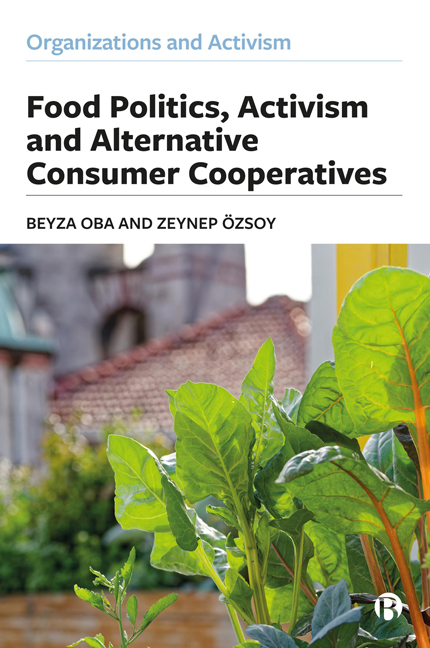Book contents
- Frontmatter
- Contents
- Series Editors’ Preface
- 1 Introduction: Experimenting with Direct Democracy
- 2 The Politics of Food: Alignment for Solidarity and Resistance
- 3 Against Neo-Liberalism and Authoritarianism: The Background to Food Politics in Turkey
- 4 The Political Economy of Consumer Cooperatives in Turkey
- 5 Alternative Consumer Cooperatives in the Making of a Public Sphere
- 6 Experimenting with an Alternative to the Capitalist Food Provisioning System
- 7 The Governance of Alternative Consumer Cooperatives
- 8 Instead of a Conclusion
- Notes
- References
- Index
2 - The Politics of Food: Alignment for Solidarity and Resistance
Published online by Cambridge University Press: 27 March 2024
- Frontmatter
- Contents
- Series Editors’ Preface
- 1 Introduction: Experimenting with Direct Democracy
- 2 The Politics of Food: Alignment for Solidarity and Resistance
- 3 Against Neo-Liberalism and Authoritarianism: The Background to Food Politics in Turkey
- 4 The Political Economy of Consumer Cooperatives in Turkey
- 5 Alternative Consumer Cooperatives in the Making of a Public Sphere
- 6 Experimenting with an Alternative to the Capitalist Food Provisioning System
- 7 The Governance of Alternative Consumer Cooperatives
- 8 Instead of a Conclusion
- Notes
- References
- Index
Summary
Refute and rebuild … another world is possible.
Yılmaz et al, Yeniden İnşa Et, 2020, p 270; Kadıköy Kooperatif, 2021Introduction
Is capitalism the only way to organize the economy and production relations? Is profit the only value that can be created by organizations? Taking capitalism and capitalist forms of organizing as the only possibility for an economic and political system limits our vision; we do not see or try to experiment with alternative forms of organizing. In this book our aim is to show that organizations shaped by non-capitalist forms of production relations and value creation orientations and practices do exist. In so doing, we view alternative consumer cooperatives (ACCs) as an alternative, non-capitalist form of organizing. Activists involved in ACCs refuse to accept the prevailing power relations and experiment with a different surplus generation and governance model; their practice is based on the ‘ethics of solidarity’ (Gibson-Graham, 2003); rather than opting for profitability they aim to establish solidaristic, unmediated and trust-based ties between rural petty commodity producers and the urban middle class. Their daily practices are prefigurative; they experiment with what they aim for. They envision direct democracy and organizations devoid of hierarchies and inequalities. These are not fantasies, they are, at least to a certain extent, practised.
During our field study and analysis of the secondary data we have seen that the founders of the ACCs are inspired by the works of diverse economies, alternative organizations and are involved in prefigurative politics. Thus in this chapter, in order to provide a background for the underlying premises and practices of the ACCs, we elaborate on the tradition of diverse economies (Gibson-Graham, 2003, 2006, 2008, 2014; Gibson-Graham et al, 2013) and alternative economic spaces (Parker et al, 2014; Parker, 2017) in order to explain how ACCs experiment with a non-capitalist form of organizing and operate with a non-capitalistic form of work, shaped by the premises of alternative food networks and the values of the food sovereignty movement. Activists involved in the ACCs deliberately search for and experiment with practices that will dislocate hegemonic capitalist relations. Such attempts by the ACCs are prefigurative since activists create ‘new’ within the ‘old’ (Leach, 2013) with the ‘conflation of their ends with their means’ (Maeckelbergh, 2014, p 350).
- Type
- Chapter
- Information
- Publisher: Bristol University PressPrint publication year: 2023



